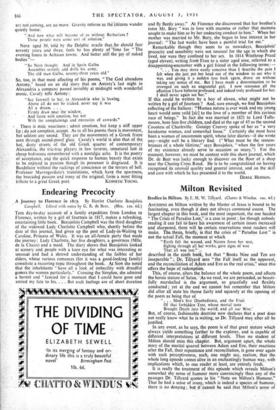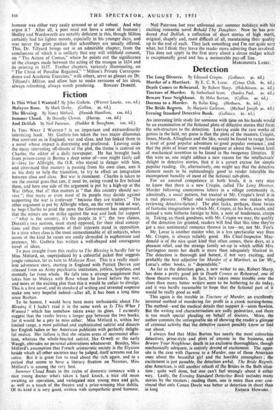Milton Revisited ,
Studies in Milton. By E. M. W. Tillyard. (Chatto & Windus. T OS. 6d.) ANYTHING on Milton written by the Master of Jesus is bound to be fascinating, even though it does not always command assent. The largest chapter in this book, and the most important, the one headed " The Crisis of Paradise Lost," is a case in point ; for though nobody reading it can fail to\have his awareness of certain issues increased and sharpened, there will be certain reservations most readers will make. Thft thesis, briefly, is that the crisis of " Paradise Lost " is
not the actual Fall, the moment at which -
"Earth felt the wound, and Nature from her seat,
Sighing through all her works, gave signs of woe
That all was lost."-,:
described in the ninth bdOk, but that " Books Nine and Ten are inseparable ; Dr. Tillyard sees " the Fall itself as the apparent, and the reconciliation of Adam and Eve as the real crisis," since. this offers the hope of redertiption.
This, of course, alters the balance of the whole poem, and affects the heroic stature of Satan. As we read, we are persuaded, so beauti- fully marshalled is the ,argument, so gracefully and flexibly conducted ; yet at the end we cannot but remember that Milton did after all state his theme fairly and squarely at the opening of the poem as being that of . . . Man's first Disobedience, and the Fruit
Of that forbidden-Tree; whose mortal taste Brought Death into 'the .world, and all our Woe."
But, of course, fashionable doctrine now declares that a poet does not really know what he is.writing, so Dr. Tillyard may after all- be justified.
In any event, as he says, the poem is of that great stature which always yields something further to the explorer, and is capable of different interpretations at different levels. Thus no student of Milton should miss this chapter. But, argument apart, the whole story of the marital quarrel between Adam and Eve, their reactions after the Fall, their repentance and reconciliation, is gone over again with such perceptiveness, such, one might say, realism, that the whole long episode comes alive in an enchantingly human way, with implications which, to one reader at least, are entirely fresh.
It is really the treatment of this episode which reveals Milton'S somewhat shy sense of humour more 'convincingly than any of the passages Dr. Tillyard quotes in his "Note on Milton's Humour." That he had a sense of irony, which is indeed a species of humour, there is no denying ; but it cannot be said that Milton's sense of
humour was either very easily aroused or at all robust. And why argue it ? After ail, a poet need not have a sense-of humour ; Shelley and Wordsworth are notably deficient in this, though Milton certainly had his lighter moods, especially in his- younger days, and was never the grim puritan that schoolboys are usually offered. This, Dr. Tillyard brings out in an admirable chapter; from the conclusions of which it is unlikely that any will withhold consent, on " The Action of Comus," where he points out the significance of the changes made between the acting of the masque in 1634 and its printing in 1637. Further chapters, variously illuminating, on ".The Christ of Paradise Regained," " Milton's Private Correspon- dence and Academic Exercises," with others, serve as glosses on Dr. Tillyard's Milton, and allow him to make revisions of his ideas, always refreshing, always worth pondering. BONAMY Dosai.d.































 Previous page
Previous page